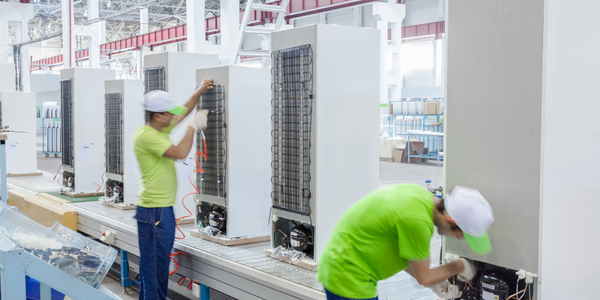Refrigeration Plant in Climatic Wind Tunnel

- Automotive
Johnson Controls has advised Jaguar Land Rover on matters relating to the service, maintenance and repair of the Heating, Ventilation, Air Conditioning & Refrigeration (HVAC&R) systems installed at the Gaydon Centre for almost 20 years. In 2012 we were invited to submit a proposal for replacement of the evaporator installed in the Climatic Wind Tunnel. In a ‘Site Survey Report’ submitted to Jaguar Land Rover, we drew their attention to the key factors that we believed were behind the evaporator’s less then optimum level of performance. The bulk of these stemmed from the fact that the existing evaporator was over 20 years old and throughout its working life a number of design changes had been made to the overall system that it formed a part of, thus rendering it no longer fit for purpose. Examples of such key factors included: • The old evaporator’s level of performance was now too ‘industrial’. It was capable of operating within a temperature range of -40°C and +55°C, while projected requirements were for a temperature range of between -10°C and +50°C. • Our concerns were raised over the suitability of the existing heat transfer fluid being used, which was proving to be highly corrosive. • The old evaporator was still operating on the soon to be banned R22 refrigerant. The use of all HCFCs for the service and maintenance of HVAC&R systems will become a criminal offence from 1st January 2015.
• The requirement for a less ‘industrial’ unit led Jaguar Land Rover to seek bid proposals for replacement chillers that met two specifications; one for low temperature testing at -10°C and one for higher temperature testing at 0°C. • During the tender process we questioned Jaguar Land Rover about the level of demand for testing at sub-zero temperatures in the Climatic Wind Tunnel and discovered that it accounted for less than 5% of the total time spent testing in this facility. This proved to be a crucial factor when it came to plant selection. • Both options proposed included Johnson Controls’ own-brand Sabroe® and YORK® equipment, thus providing the customer with a superior level of build quality and a standardised commercial offering. Other products manufactured by Johnson Controls (i.e. valves and controls) also made up our package. • Analysis of performance levels being achieved by the existing plant was carried out, thus allowing us to calculate areas where potential energy savings and cost efficiencies could be achieved. Our findings were very well received by Jaguar Land Rover. • To counter the heat transfer fluid issues, we initially carried out tests using glycol before settling on the newly developed environmentally friendly heat transfer fluid Thermera® AC, following discussions with product developer Climalife. Again, during the tender process we calculated the projected impact Thermera® would have on plant performance. • All figures calculated during the test phases, and submitted to Jaguar Land Rover to assist them in identifying projected energy savings and cost efficiencies, were ultimately verified upon completion of the works. • Two YORK® YVWA water cooled screw chillers were supplied and installed. Designed by Johnson Controls, these units use a number of engineering advances to address four primary requirements of building owners; i.e. efficiency, application flexibility, sustainability and confidence. • The existing evaporative tower was re-used for heat rejection purposes and also for providing free cooling during the high ambient tests undertaken by Jaguar Land Rover. The result being that the chillers will only be required to run for around 10% of time spent on testing.
Related Case Studies.











